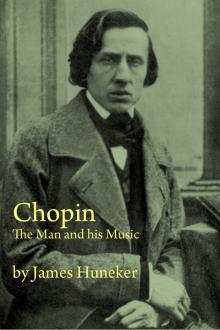Haydn by J. Cuthbert Hadden (books you need to read TXT) 📖

- Author: J. Cuthbert Hadden
Book online «Haydn by J. Cuthbert Hadden (books you need to read TXT) 📖». Author J. Cuthbert Hadden
Come Early
The next letter shows that Haydn had been deriving some profit from Mistress Schroeter's affections by setting her to work as an amanuensis. She has been copying out a march, and is sorry that she has not done it better. "If my Haydn would employ me oftener to write music, I hope I should improve; and I know I should delight in the occupation." Invitations to dine at St James's Street are repeatedly being sent, for Mistress Schroeter wishes "to have as much of your company as possible." When others are expected, Haydn is to come early, so that they may have some time together "before the rest of our friends come." Does the adored Schroeter go to one of her "dearest love's" concerts, she thanks him a thousand times for the entertainment. "Where your sweet compositions and your excellent performance combine," she writes, "it cannot fail of being the most charming concert; but, apart from that, the pleasure of seeing you must ever give me infinite satisfaction." As the time drew near for Haydn's departure, "every moment of your company is more and more precious to me." She begs to assure him with "heart-felt affection" that she will ever consider the acquaintance with him as one of the chief blessings of her life. Nay, she entertains for her "dearest Haydn" "the fondest and tenderest affection the human heart is capable of." And so on.
An Innocent Amourette
One feels almost brutally rude in breaking in upon the privacy of this little romance. No doubt the flirtation was inexcusable enough on certain grounds. But taking the whole circumstances into account--above all, the loveless, childless home of the composer--the biographer is disposed to see in the episode merely that human yearning after affection and sympathy which had been denied to Haydn where he had most right to expect them. He admitted that he was apt to be fascinated by pretty and amiable women, and the woman to whom he had given his name was neither pretty nor amiable. An ancient philosopher has said that a man should never marry a plain woman, since his affections would always be in danger of straying when he met a beauty. This incident in Haydn's career would seem to support the philosopher's contention. For the rest, it was probably harmless enough, for there is nothing to show that the severer codes of morality were infringed.
The biographers of Haydn have not succeeded in discovering how the Schroeter amourette ended. The letters printed by Mr Krehbiel are all confined to the year 1792, and mention is nowhere made of any of later date. When Haydn returned to London in 1794, he occupied rooms at No. 1 Bury Street, St James', and Pohl suggests that he may have owed the more pleasant quarters to his old admirer, who would naturally be anxious to have him as near her as possible. A short walk of ten minutes through St James' Park and the Mall would bring him to Buckingham Palace, and from that to Mrs Schroeter's was only a stone-throw. Whether the old affectionate relations were resumed it is impossible to say. If there were any letters of the second London visit, it is curious that Haydn should not have preserved them with the rest. There is no ground for supposing that any disagreement came between the pair: the facts point rather the other way. When Haydn finally said farewell to London, he left the scores of his six last symphonies "in the hands of a lady." Pohl thinks the lady was Mrs Schroeter, and doubtless he is right. At any rate Haydn's esteem for her, to use no stronger term, is sufficiently emphasized by his having inscribed to her the three trios numbered 1, 2 and 6 in the Breitkopf & Hartel list.
Haydn's Note-Book
Reference has already been made to the diary or note-book kept by Haydn during his visit. The original manuscript of this curious document came into the hands of his friend, Joseph Weigl, whose father had been 'cellist to Prince Esterhazy. A similar diary was kept during the second visit, but this was lost; and indeed the first note-book narrowly escaped destruction at the hands of a careless domestic. Haydn's autograph was at one time in the possession of Dr Pohl. A copy of it made by A. W. Thayer, the biographer of Beethoven, in 1862, became, as previously stated, the property of Mr Krehbiel, who has printed the entries, with running comment, in his "Music and Manners in the Classical Period" (London, 1898). Mr Krehbiel rightly describes some of the entries as mere "vague mnemonic hints," and adds that one entry which descants in epigrammatic fashion on the comparative morals of the women of France, Holland and England is unfit for publication. Looking over the diary, it is instructive to observe how little reference is made to music. One or two of the entries are plainly memoranda of purchases to be made for friends. There is one note about the National Debt of England, another about the trial of Warren Hastings. London, we learn, has 4000 carts for cleaning the streets, and consumes annually 800,000 cartloads of coals. That scandalous book, the Memoirs of Mrs Billington, which had just been published, forms the subject of a long entry. "It is said that her [Mrs Billington's] character is very faulty, but nevertheless she is a great genius, and all the women hate her because she is so beautiful."
Prince of Wale's Punch
A note is made of the constituents of the Prince of Wales's punch--"One bottle champagne, one bottle Burgundy, one bottle rum, ten lemons, two oranges, pound and a half of sugar." A process for preserving milk "for a long time" is also described. We read that on the 5th of November (1791) "there was a fog so thick that one might have spread it on bread. In order to write I had to light a candle as early as eleven o'clock." Here is a curious item--"In the month of June 1792 a chicken, 7s.; an Indian [a kind of bittern found in North America] 9s.; a dozen larks, 1 coron [? crown]. N.B.--If plucked, a duck, 5s."
Haydn liked a good story, and when he heard one made a note of it. The diary contains two such stories. One is headed "Anectod," and runs: "At a grand concert, as the director was about to begin the first number, the kettledrummer called loudly to him, asking him to wait a moment, because his two drums were not in tune. The leader could not and would not wait any longer, and told the drummer to transpose for the present." The second story is equally good. "An Archbishop of London, having asked Parliament to silence a preacher of the Moravian religion who preached in public, the Vice-President answered that could easily be done: only make him a Bishop, and he would keep silent all his life."
On the whole the note-book cannot be described as of strong biographical interest, but a reading of its contents as translated by Mr Krehbiel will certainly help towards an appreciation of the personal character of the composer.
CHAPTER VI(SECOND LONDON VISIT--1794-1795)Beethoven--Takes Lessons from Haydn--The Relations of the Two Composers--The Haydn Museum--Haydn starts for London--His Servant Elssler--The Salomon Concerts--A "Smart" Drummer--New Acquaintances--Haydn at Bath--Opera Concerts--Kingly Courtesies-- A Valuable Parrot--Rohrau Reminiscences--Esterhaz once more--The "Austrian Hymn"--Haydn's Love for It--A Charge of Plagiarism.
Haydn left London some time towards the end of June 1792. He had intended to visit Berlin, in response to an invitation from King Frederick William II., but he altered his route in order to meet Prince Anton Esterhazy, who was at Frankfort for the coronation of the Emperor Francis II.
Beethoven
A more interesting meeting took place at Bonn. Beethoven, then a young man of twenty-two, was still living with his people in the Wenzegasse, but already arrangements had been made by the Elector for his paying a somewhat lengthened visit to Vienna in order to prosecute his studies there. Since the death of Mozart, Haydn had become the most brilliant star in the musical firmament, and it was only natural that the rising genius should look to him for practical help and encouragement. It so happened that the Elector's Band, of which Beethoven was a member, gave a dinner to Haydn at Godesberg. The occasion was opportune. Beethoven submitted a cantata to the guest of the evening which Haydn "greatly praised, warmly encouraging the composer to proceed with his studies." The name of the cantata has not been ascertained, though Thayer conjectures it to have been on the death of the Emperor Leopold II.
Whatever it was, the fact of Haydn's approval would make it an easy matter to discuss the subject of lessons, whether now or later. Beethoven did not start for Vienna until November, and it appears that immediately before that date some formal communication had been made with Haydn in reference to his studies. On the 29th of October Count Waldstein wrote:
"DEAR BEETHOVEN,--You are travelling to Vienna in fulfillment of your long-cherished wish. The genius of Mozart is still weeping and bewailing the death of her favourite. With the inexhaustible Haydn she found a refuge, but no occupation, and is now waiting to leave him and join herself to someone else. Labour assiduously, and receive Mozart's spirit from the hands of Haydn."
This was not exactly complimentary to Haydn, but Beethoven doubtless had the good sense not to repeat the count's words. When the young artist arrived in Vienna, he found Haydn living at the Hamberger Haus, No. 992 (since demolished), and thither he went for his lessons. From Beethoven's own notes of expenses we find that his first payment was made to Haydn on December 12. The sum entered is 8 groschen (about 9 1/2 d.), which shows at least that Haydn was not extravagant in his charges.
Master and Pupil
Beethoven's studies were in strict counterpoint, and the text-book was that same "Gradus ad Parnassum" of Fux which Haydn had himself contended with in the old days at St Stephen's. How many exercises Beethoven wrote cannot be said, but 245 have been preserved, of which, according to Nottebohm, Haydn corrected only forty-two. Much ink has been wasted in discussing the relations of these distinguished composers. There is no denying that Haydn neglected his young pupil, but one may find another excuse for the neglect besides that of his increasing age and his engrossing occupations. Beethoven was already a musical revolutionist: Haydn was content to walk in the old ways. The two men belonged almost to different centuries, and the disposition which the younger artist had for "splendid experiments" must have seemed to the mature musician little better than madness and licentious irregularity. "He will





Comments (0)